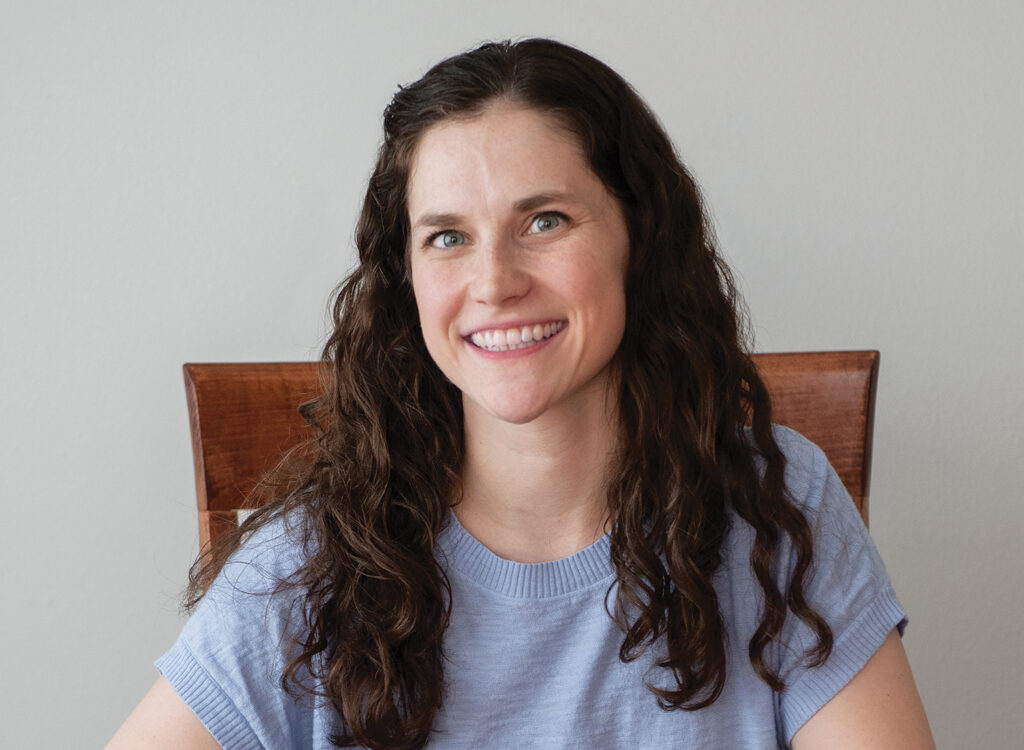Full speed ahead
Life and annuity companies’ growth fueled by private equity firms

JOE GARDYASZ Aug 4, 2021 | 2:26 pm
15 min read time
3,536 wordsBanking and Finance, Business Record Insider
As many of F&G’s employees entered the insurance company’s newly remodeled downtown Des Moines headquarters at 801 Grand for the first time in recent weeks, some may have noticed their leader, Chris Blunt, standing in the lobby with a big grin. The annuity company’s president and CEO says that one of his favorite activities has been to hang out at the lobby occasionally to watch their reactions to the impressive new space. “It’s pretty awesome,” he said.
While business for many life and annuity companies across the country was slowing down during the pandemic, Des Moines-based Fidelity & Guaranty Life Insurance Co. — which does business as F&G — has been enjoying rapid growth and a strong capital position. The company most recently reported fixed indexed annuity sales of $947 million in the fourth quarter, up 19% from fourth quarter 2019 and a 16% increase from third quarter 2020.
F&G has gained massive new market share in the fixed annuity space, rocketing from No. 5 to No. 2 seller in the past 12 months. With that growth, F&G currently has expanded to 524 employees companywide, with 387 based in downtown Des Moines. Additionally, the company has just under 100 additional positions it’s seeking to fill.
F&G owes much of its success to relationships it has with Fidelity National Financial, a $13 billion title insurance company that acquired F&G in 2020, and its strategic relationship with Blackstone Group, the private equity firm that manages F&G’s investment portfolio.
The company’s growth is part of a larger trend of significant merger and acquisition activity and strategic partnerships between life and annuity companies and private equity or alternative asset management firms in recent years.
According to a special report recently published by the credit rating agency AM Best, “the PE [private equity] industry has significantly increased its exposure in the [life and annuity] insurance industry since 2011. PE insurers’ admitted assets grew from $67.4 billion in 2011 to $604.1 billion in 2020, as more insurance companies have been acquired.”
In July, that trend continued as Blackstone Group announced plans to acquire a nearly 10% ownership stake in American International Group’s life and retirement business for $2.2 billion.
Similar transactions have shifted the landscape among Iowa-based insurance companies within the past year:
- In March, Athene Holding Ltd., the parent company of West Des Moines-based Athene USA, announced that its longtime strategic partner and investor, Apollo Global Management, will merge with Athene in an all-stock deal valued at about $11 billion. The merger will make Apollo shareholders the majority owners of the combined company, and align Apollo as both Athene’s owner and asset manager.
- In February, Global Atlantic Financial Group Ltd. announced the completion of its previously announced strategic partnership with KKR & Co. Inc., a deal that made Global Atlantic a consolidated subsidiary of KKR. In addition to a 60% controlling interest in Global Atlantic, which has annuity operations in Des Moines, KKR will manage approximately $90 billion of assets for Global Atlantic.
- In October 2020, West Des Moines-based American Equity Investment Life Holding Co. reached a strategic partnership with Brookfield Asset Management Inc. in which Brookfield will reinsure up to $10 billion in fixed indexed annuities in exchange for American Equity agreeing to issue common stock to Brookfield with the objective of the firm becoming a key investor in AEL. Based in Toronto, Brookfield is a leading global alternative asset manager.
- Additionally, Principal Financial Group in June announced significant changes to its product portfolio and capital management strategy following a strategic review as part of a cooperation agreement with one of its largest investors, Elliott Investment Management. The strategy includes making a full exit from the U.S. retail fixed annuities business, a move that will create new opportunities for acquisitions by companies seeking to solidify market share in that area.
The deals come on the heels of a challenging period for the annuity business. Total fixed indexed annuity sales in the United States were $55.5 billion for calendar year 2020, a 24.5% decrease from 2019, according to global research firm LIMRA. The continuing low interest rate environment and challenging macroeconomic conditions from the pandemic made it a difficult time for many firms.
A prime target for private equity
As the AM Best report noted: “The annuity insurers’ business model is a prime target for the new private equity model, offering a reliable revenue stream of invested capital while also offering permanent capital that is stable and positioned for the long term.” According to the report, annuity premiums have accounted for more than 70% of direct premiums written at private equity-owned/sponsored companies since 2011.
Another research study on private equity investments in the life and annuity industry documented 57 private equity acquisitions of life insurance subsidiaries between 2005 and 2014. The study, led by a researcher at the University of Pennsylvania Law School, found that
private equity’s share of the fixed annuity industry grew from 3% of sales to 20% of the market by 2014.
Kevin Croft, a former American Equity executive and currently the Distinguished EMC associate professor of practice and director of the Kelley Center for Insurance Innovation at Drake University, has found from experience that annuity companies are extremely creative in developing new strategies for enhancing investment returns. He worries the increase in strategic partnerships could open the door to investments that are too aggressive or risky, as life insurers found about two decades ago.
“I have a slight concern we may repeat some of those experiences,” he said. “The PE firms are taking the annuity industry right back into those private placements and other asset-backed securities, and that’s a concern.”
At the same time, regulators “are doing a very good job” in recognizing if strategies become too aggressive or represent too much risk, he said.
An industry expert in the insurance-linked investments and risk transfer markets, Steve Evans, owner and publisher of the Artemis newsletter, said there are benefits to the insurer-private equity relationship, but he offered similar caveats.
“Global asset managers and private equity giants have always found insurance and reinsurance attractive and the life/annuity segment can be particularly so, given the large amounts of capital that can be accumulated as investment float,” Evans wrote in an emailed statement.
“However, these players really need to stay on top of the servicing of underlying policies, as it’s not possible to abstract the capital away from the underlying risk or the customers that still demand and need a good experience from whoever the ultimate holder of their policy is,” he wrote. “In my opinion this should keep the investment giants very focused on service, continuing to ensure the experience of the policyholder, or beneficiary of the underlying policy, doesn’t suffer as they grow.”
Majority of PE-sponsored insurers saw ratings increases
In 2020, insurers backed by partnering private equity firms accounted for approximately 8.9% of the industry’s total annuity net premium written, according to AM Best’s special report recently published about private equity in insurance.
The percentages are much larger when looking specifically at the indexed and fixed indexed annuity markets — 34.2% of indexed and 22.5% of fixed annuity products now have private equity firms as owners or investors These two types of annuity products represented roughly 92% of these companies’ annuity net premium written.
The AM Best researchers found that PE firms have an immediate impact on the insurers they acquire, by infusing capital, increasing reinsurance and lowering income taxes for the insurer. In the first year of ownership, 38% of companies reported increases of over 20% in capital and surplus, rising to 43% in year two and 50% in year three.
The research report identified 70 life/annuity companies either owned or sponsored by private equity and compared changes in their investment portfolios and performance since acquisition.
Overall, ownership by private equity firms has led to higher credit and financial strength ratings for a majority of those insurers, the AM Best report found. After the initial five-year period of ownership by PE firms, the credit rating or financial strength ratings of nearly 50% of insurers were upgraded; fewer than 10% of the insurers were downgraded.
The report also noted that private equity-owned insurers boosted their liquidity by collectively borrowing $11.7 billion from the Federal Home Loan Bank system in 2020, a 41% increase from 2019. Those insurers’ FHLB borrowings had already increased by 22% in 2019.
“For companies investing the loan proceeds in their core business for working capital, these obligations would be viewed as financial leverage,” the Best report said. “If FHLB borrowings are being used for spread enhancement and the insurer can demonstrate strong asset/liability and liquidity management, AM Best would view these activities positively.”
Drake’s Kevin Croft is concerned with the longer-tailed effects that the use of higher-yield, higher-income and higher-risk infrastructures may have on the annuity industry. “It is changing the underlying fabric of the investment industry,” he said. “Time will tell how well this works out for the policyholders and shareholders of these companies.”
Croft provided a couple of examples in which state insurance regulators, through the National Association of Insurance Commissioners, have collectively taken a stance on more aggressive types of investments that have been made in recent years by private equity-backed insurers. Before joining Drake, Croft worked for 11 years for American Equity Investment Life Holding Co., where he led the investment team managing the company’s portfolio.
One strategy used by some private equity-sponsored insurers has been to use combo CLOs — an investment vehicle that combines several tranches of instruments known as collateralized loan obligations of various risk ratings that have gotten relatively high ratings even though it contains lower-rated tranches of debt obligations.
“At American Equity, we had never purchased combo notes,” Croft said, “because when the economy gets difficult, the equity distributions [included in the investments] can be turned off to protect higher-rated returns. So in a time of stress in the financial markets, do I want my investment returns to go down? My investment conclusion and recommendation was no, I don’t think you should.”
Overall, Croft said that bringing private equity fund managers’ willingness to take higher risks into an insurance setting is concerning to him. “If private equity managers don’t hit their [return] targets, will they become less interested in the insurance industry in the future? I think the [insurance] industry over its several hundred years has been very balanced,” he said. In my opinion, the introduction of PE sponsors raises the risk across the board.”
‘A totally different animal’
F&G’s CEO said he is frequently frustrated when insurance industry reports conflate the investment management relationship that F&G has with Blackstone as being a private equity ownership position. Although Blackstone is a private equity firm, it’s also an alternative asset manager, and that latter role is its sole relationship with F&G, he said.
“Blackstone doesn’t own any [shares of] F&G, and actually never did directly,” Blunt said. While a Blackstone investment fund had previously held 21% of F&G’s shares, it never had a controlling interest in F&G, and since its acquisition of FNF, Blackstone no longer has that indirect ownership through its funds.
In June 2020, Fidelity National Financial, a Florida-based Fortune 500 company and the largest U.S. title insurance company, completed its acquisition of F&G. While Blackstone manages all of F&G’s investments, the private equity company has no ownership or board control of either F&G or FNF.
“The notion of private equity companies owning [insurance] companies themselves is a totally different animal,” he said. A larger competitor, Athene USA, for instance, represents an insurer that is owned by a private equity firm. With Apollo Global Management’s pending acquisition of the remaining assets of Athene Holding Ltd., Apollo will by next year own 100% of Athene.
“That’s not our model,” Blunt said. “We get frustrated because people put them in the same camps, but I would argue — and I don’t mean this in a disparaging way — that they’re just not the same.”
At F&G, “We think selfishly we have the best model going with FNF as a parent $13 billion [in market value] company,” Blunt said. “They [produce] probably a billion a year of free cash flow so they’ve been terrific with capital support and strategic support. Bill Foley, who’s the founder and chairman of FNF, was the co-chair of the board of F&G. He’s been our biggest champion and continues to be — he thinks the opportunity is massive.”
By serving as F&G’s private credit manager, Blackstone provides F&G access to high-quality deals that can give the insurer a 150 basis-point (1.5 times) greater return than deals in the public markets, Blunt said.
Those types of investments often involve securitized loans backed by hard assets ranging from aircraft, building leases, cell towers and even music royalties. While that category of asset-backed securities makes up a relatively small piece of F&G’s investment portfolio — between 15% and 20% — “that’s where our competitive edge comes from,” Blunt said.
While analysts warn that the lack of liquidity of these types of investments is problematic, “the reason it works in our context is our primary products are fixed indexed annuities,” he said. “They tend to be longer in term, and they are very difficult [for policyholders] to cash out early, by design. And clients know that the benefit and where they get the return in our product is the fact that they know they’ve tied [their money] up for five, six or seven years with us.”
‘The saving grace of the annuity industry’
Grant Kvalheim, president of Athene USA, said he’s excited about Athene’s pending merger with Apollo, which has been a strategic investment partner from the time that Athene acquired Aviva USA 12 years ago.
“I kind of always guessed that maybe one of the outcomes would be that we ultimately merged,” he said in a recent interview with the Business Record. “I’m a little surprised at the timing, but I think it makes total sense.”
Through more than a decade of explosive growth, Athene has consistently met its commitments to its policyholders, Kvalheim said. The growth has brought significant employment and a newly constructed headquarters in West Des Moines, along with a company that has paid its civic dues to the community, he said.
“I think the missing piece of the puzzle has been a great equity story,” he said, noting that Athene’s stock price hasn’t increased as much as he would have expected in the past four years, at a time when the S&P 500 index has doubled. “That’s why this deal makes a lot of sense — Apollo has been a great performing stock with a very nice dividend. And I think the market agrees with that assessment; [since the merger announcement] our stock is up over 35%.”
Regarding the AM Best special report’s conclusions about the effects of private equity in insurance, Kvalheim said he believes that Athene’s track record proves that private equity firms’ involvement has been beneficial for the company and for the industry overall.
“From my perspective, private equity has been the saving grace of the annuity industry,” Kvalheim said. “All of the traditional players have been removing capital from the industry while the private equity firms have been providing capital to the industry, whether it’s Global Atlantic or Athene or F&G — or now Blackstone buying 10% of AIG.
“The [private equity firms] have been a force for good; if you look at the ratings of the companies that they work with, they’ve been responsible operators and have shown long-term commitment,” he said.
In the case of Athene, the media was “pretty skeptical” when it was announced that Athene was buying Aviva, Kvalheim said. “There were a lot of questions about the commitment of private equity, are they going to be in it for the long haul. I think we’ve demonstrated pretty conclusively that our capital was permanent and that our commitment was real and for the long haul.”
Kvalheim said he doesn’t have a lot of patience with industry analysts who continue to voice concerns about the increasing complexity and potential risk of investments made by private equity firms on behalf of their annuity partners.
“I’ve heard [those arguments] the entire time that Athene has been in business,” he said. “First of all, I think it’s more appropriate to refer to firms like Apollo as alternative asset managers. They certainly started in the private equity business, but at this point a much larger percentage of their assets under management are credit assets versus private equity assets. … We’re now in our 12th year, and as a whole our [credit] impairments have been lower than the industry as a whole.”
While Athene has partnered with Apollo from the beginning, Athene’s investment portfolio doesn’t include any private equity assets. “We have trace amounts in hedge funds that really have to do with assets that we purchased when we bought other companies,” he said. “So we think we’ve been pretty disciplined in the way we’ve run our asset portfolio — the returns and the impairments show that. It’s blind speculation for people who continue to bring up [concerns over private equity partnerships].”
In terms of market share, Athene emerged from 2020 as the largest seller of fixed indexed annuities in the industry, edging out Allianz, which had been the market leader for more than a decade. Athene’s market share in fixed indexed annuities increased to 12.1% in the first quarter, up from 10.5% for full-year 2020.
The company took a different approach than many of its competitors, returning partially to its headquarters beginning in June 2020, with 100% of staff back in the office by the end of July 2020. They scaled back to 50% in-office during the pandemic’s spike in the fall, but returned to 100% in January. With careful protocols, Athene literally had zero cases of in-office transmission, Kvalheim said.
“We hired well over 200 people last year in West Des Moines with the ability to recruit and hire people, collaborate, have face-to-face meetings,” he said. “When I talk to peers and they talk about burnout or productivity challenges due to the isolation of working from home, I counter with ‘Bring people back to the office.’”
Looking at what’s ahead for the annuity industry in the next five to years, Kvalheim anticipates a continuation of the restructuring trend.
“I think every company is figuring out what they believe to be their strategic advantages and focusing on those, and then disposing of businesses that don’t meet those strategic priorities,” he said. “And that provides some opportunities for Athene to acquire some of those businesses that are deemed not core within those organizations.”
More consolidation ahead as private equity trend continues to unfold
Tom Rosendale, a senior director with AM Best who specializes in the life and annuity industry, said the rating agency uses a proprietary risk-adjusted capital model to gauge how well private equity-sponsored insurers are balancing risk as they seek higher investment returns. AM Best also employs an investment advisory group that closely scrutinizes the various investment choices the insurers are adopting.
“From our perspective, we feel we’re accounting for [the added risk exposure] in our ratings,” he said in a videoconference interview. “We’ve found, generally speaking, that the companies entering this market are very well-versed in risk-adjusted capital and asset risk, and on the views that the NAIC holds as well as the rating agencies.”
Rosendale said he would agree that more consolidation appears to be ahead in the annuity business.
“The interest rate environment is a fairly significant part of this [trend],” he said. “Interest rates declined leading into the pandemic in the first quarter of 2020, and they haven’t really fully recovered. They had already been in a very depressed state for a long period of time. … So we’ve seen a lot of companies getting more concerned about interest rate risk and offloading blocks of interest-sensitive business, primarily on the annuity side.”
Mark Power, an Iowa State University finance professor who has researched the insurance industry for years, observed that financial stability has always been important to insurance companies. The trend toward private equity firms’ ownership and asset management within the insurance industry is a relatively recent development, and it’s not clear yet what the impact on insurers may be, he said. It has been clear that insurers have felt “boxed in” by lower rates for some time and have been seeking better investment returns.
“I think a lot of this will work itself out over time as we get more data,” Power said. “I can’t unequivocally say whether more private equity in the life and annuity business is good or bad. Some aspects may be positive from a diversification perspective and generate a higher return. It is a regulated industry, so there should be some protection there from the perspective of taking on unnecessary risk.”











